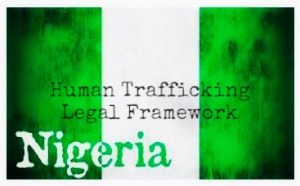 Relevant Legal Framework for HUMAN TRAFFICKING in NIGERIA
Relevant Legal Framework for HUMAN TRAFFICKING in NIGERIA
- Trafficking in Persons (Prohibition) Law Enforcement and Administration Act, 2015
- National Policy on Protection and Assistance to Trafficked Persons in Nigeria (2008)
- Guidelines on National Referral Mechanism for Protection and Assistance to Trafficked Persons in Nigeria (NRM) (2015)
- Child Rights Act, 2003
- Violence Against Persons (Prohibition) Act (2015)
- Labour Act (1974)
- Criminal Code (Sections 223, 224, 365, 366, 369)
- Edo State Criminal Code (Amendment) Law, 2000 (Section 223A) (It is anticipated that this law will soon be repealed and replaced by Edo State’s new anti-trafficking law which was unanimously adopted by the Edo State House of Assembly on March 14, 2018 and signed into law on May 23, 2018 by Governor Godwin Obaseki.)
- Edo State Trafficking In Persons Prohibition Act (2018)
- Penal Code (Sections 275, 278-280)
- Constitution of the Federal Republic of Nigeria, 1999 (Sections 17, 34, 42)
- Immigration Act, 1963 (Section 1, G-H), 2015 + Immigration Regulation, 2017
- United Nations Universal Declaration of Human Rights, 1948
- United Nations Protocol to Prevent, Suppress and Punish Trafficking in Persons Especially Women and Children (Article 3)
- United Nations Convention against Transnational Organized Crime, 2000
- Convention on the Rights of the Child, 1990
- Convention on the Elimination of All Forms of Discrimination Against Women (CEDAW), 1981 (Article 6)
- African Charter on Human and People’s Rights (Enforcement) Act, 2004
- ECOWAS Declaration and Plan of Action Against Trafficking in Persons, 2001
- Forced Labour Convention (1930)
- Minimum Age Convention, 1973 (No. 138)
- Worst Forms of Child Labour Convention, 1999 (No. 182)

